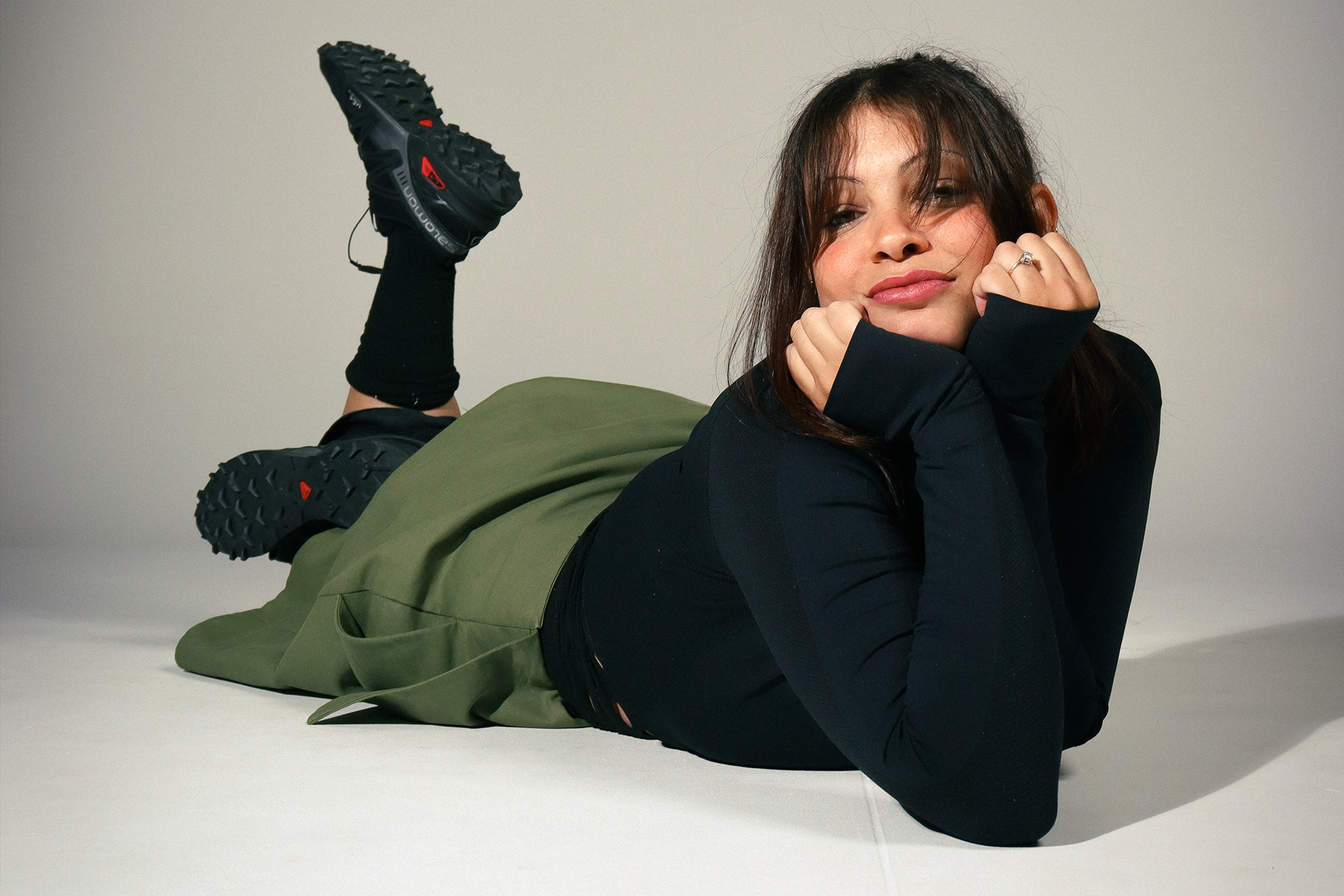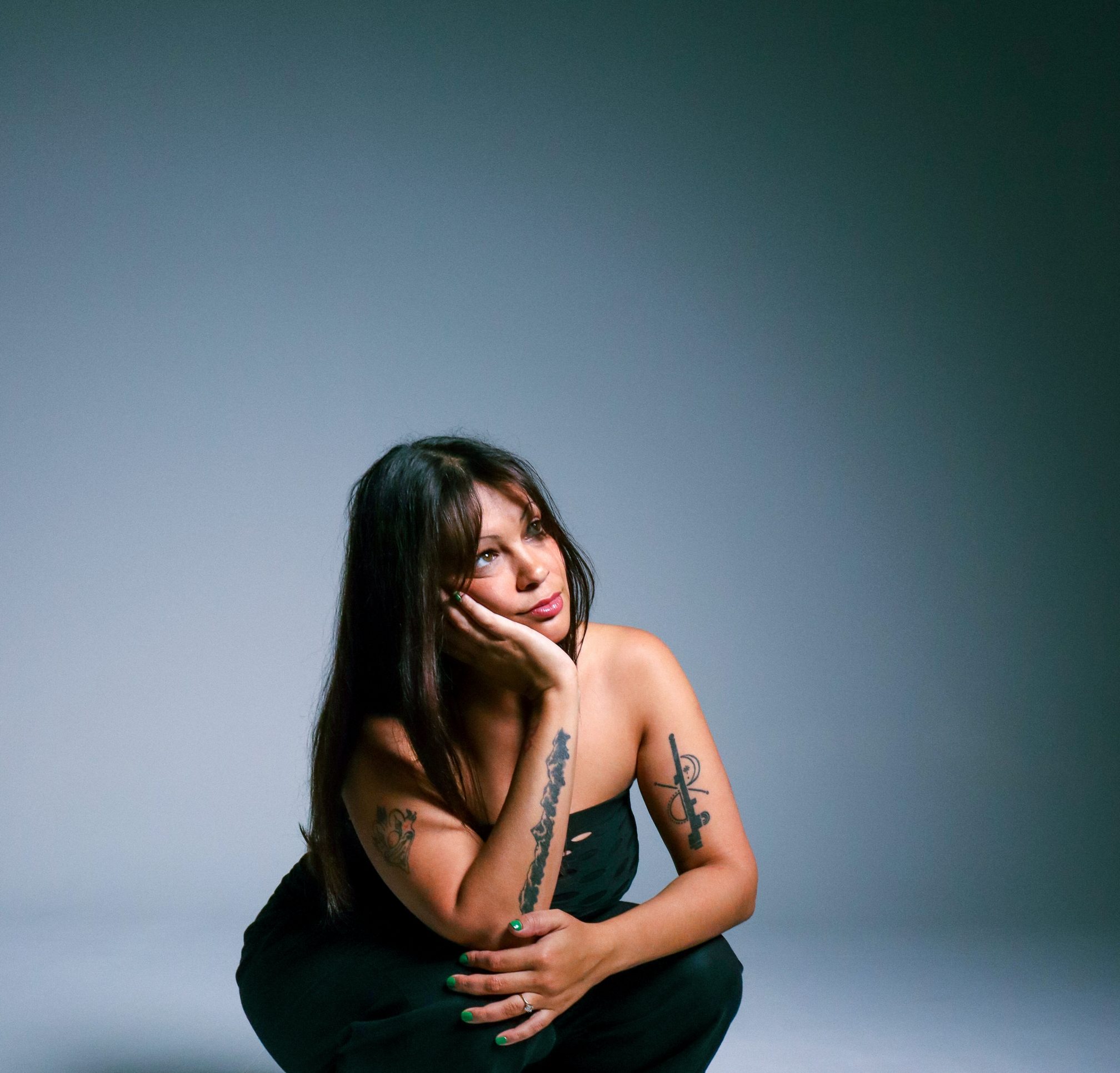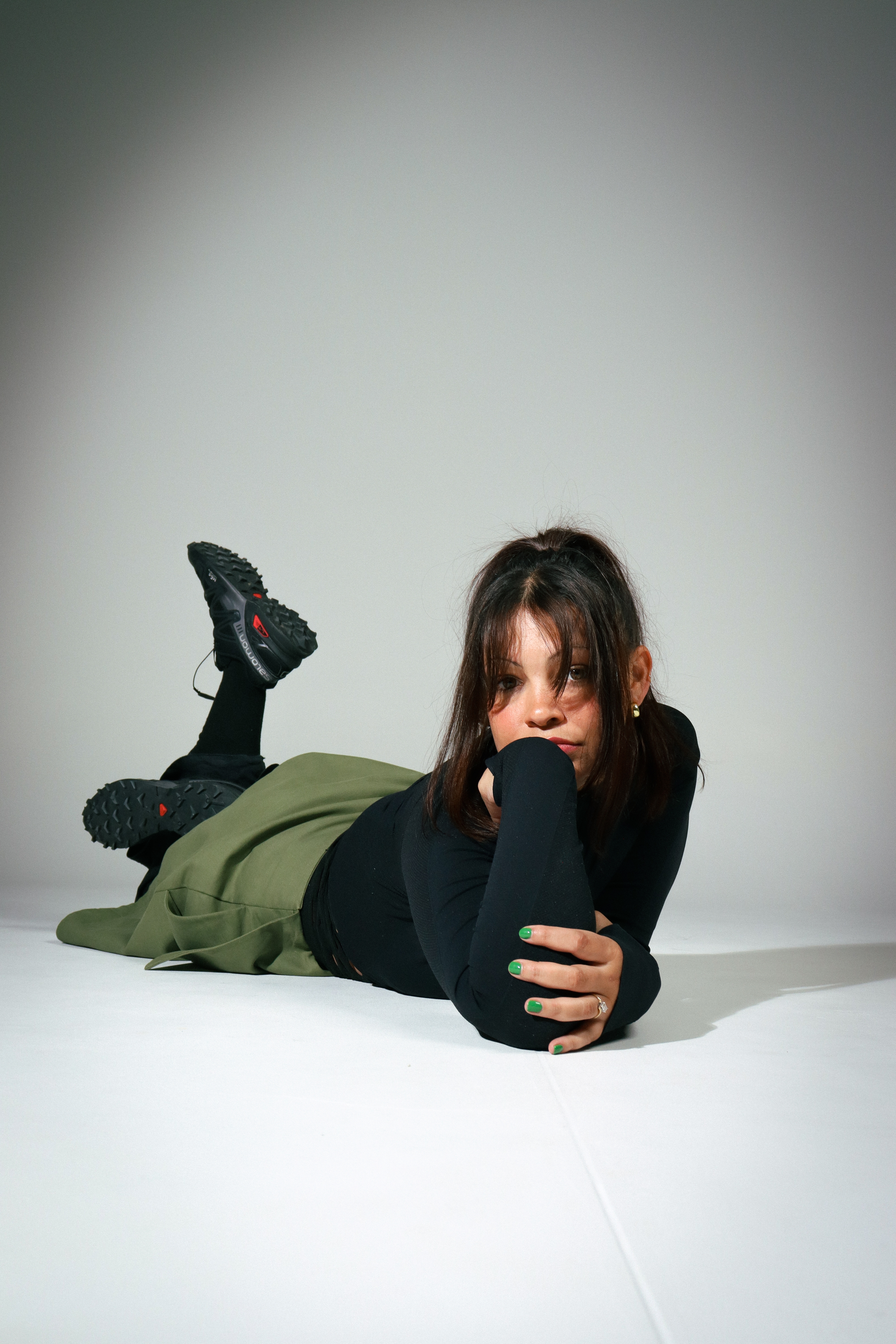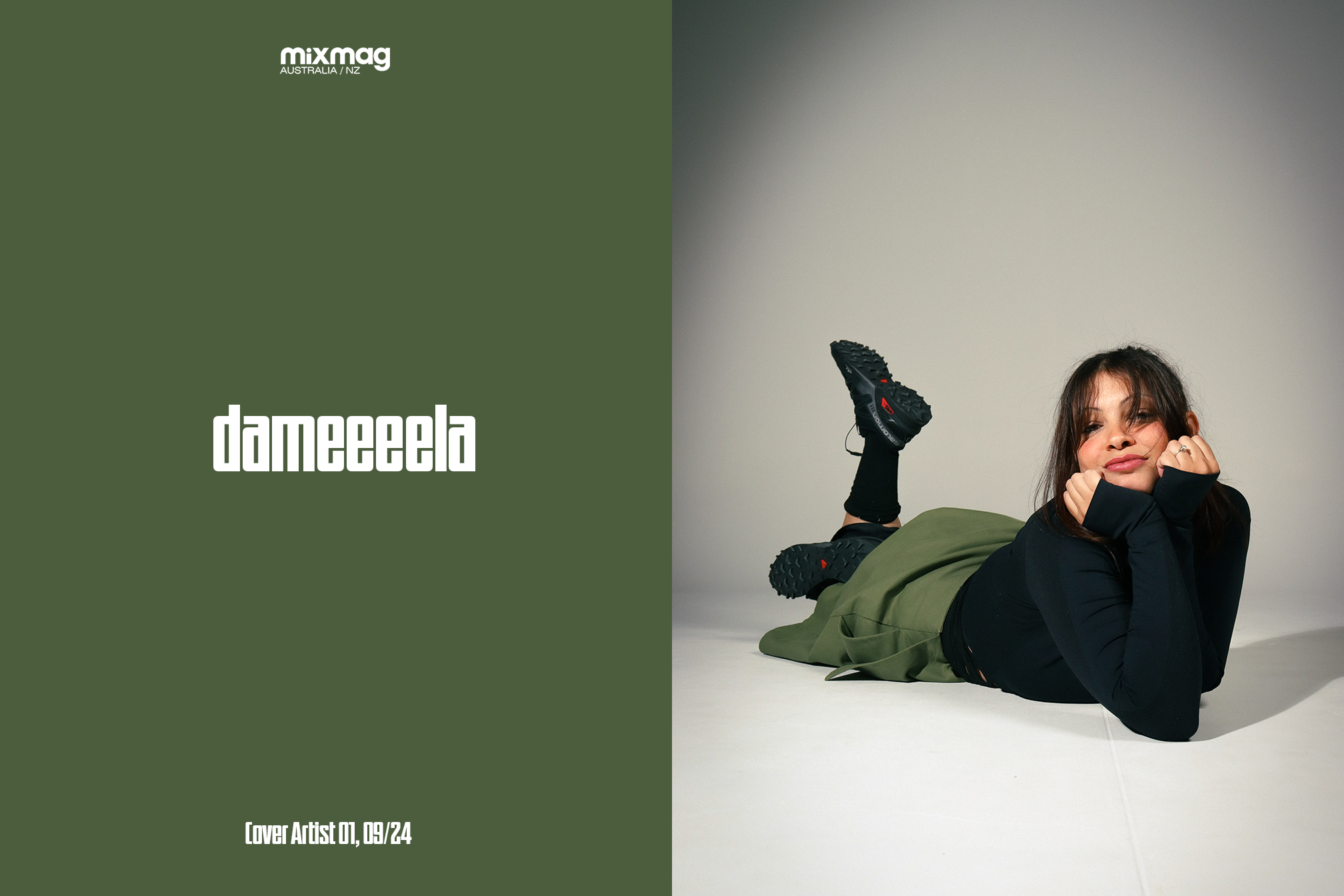 COVER STARS
COVER STARS
“You’re literally dancing on political land": dameeeela is the heart of modern Australian dance
The proud, outspoken Yuggerah (Muninjali and Kullalli) DJ speaks on being a First Nations artist, the politics of Australia’s dance industry, and her hopes for the future of it.
I caught dameeeela in an open time she had available. While her intensely busy touring schedule had me thinking initially that this was to make room for the near endless amount of domestic travel she undertakes, I learned very quickly that this was actually a free slot before school pick up.
dameeeeela’s popularity boomed with local promoters immediately after COVID lockdowns, which hasn’t at all slowed down since. She’s been a vocal critic of promoters, festivals and industry figureheads online for the way that they engage and book First Nations artists. She’s followed Fred Again, Overmono, Erika De Casier and more around the country to support, and played on huge bills for the likes of Dekmantel Naarm & Pitch in recent memory.
The free slot before school pick up, while initially seeming very much at odds with the “DJ lifestyle” we’re shown all so regularly, became an earnest, meaningful, and most importantly real indication of who one of the country’s most regularly booked DJs actually is.
dameeeela, a proud, outspoken Yuggerah (Muninjali and Kullalli) woman based in Meanjin/Brisbane, is Mixmag Australia / NZ’s first ever Cover Artist.

In a time where ‘dance music’ has never been more popular or profitable globally, our conversation started with a focus on the time that dameeeela gets to spend outside of her busy touring schedule.
In her day to day, she works at two ‘forest schools’, educational institutions focused on “risky play”, using tools and spending time outdoors. “It’s a perfect balance of the loudness of a club and then being out in the quietness as well”, she told me.
“I always see dualities,” she continued, “I’ll be at a gig and then I’ll be the first person on the plane at 6AM. I’ll be walking down the aisle and then two hours later I’ll be at work walking through the farm. Looking at my story it goes from walking down the aisle of the plane to walking between the garden beds,” she laughed.
“I can only do this much DJing because I’m doing that much time outside.”
dameeeela has been an outspoken advocate for the mental health of touring artists, particularly First Nations artists. Taking a look at her presence on social media sees her regularly sharing her thoughts and feelings on specific industry interactions, and the “business” as a whole.
“In the DJ life, it’s just so taxing to just fling yourself around from place to place. It’s like the second you wake up, you have to create engagement on Instagram. Even when you do have a gig, you can’t just post about the gig because no one is given it in their feeds when you haven’t said anything for months. You literally have to sell every minute of your life.”
While a dedication to mental health is, like in many industries, often seen as a lip service treatment, dameeeela’s dedication to supporting her peers was immediate in our conversation. She spoke of a podcast she’s working on in her spare time, a sort of “afterparty conversation” turned tangible, where she plans to interview other artists about their own experiences.
Her anecdotal experiences would be more than enough to justify such a dedication, but dameeeela’s work with Support Act, “the music industry's charity, delivering crisis relief services to musicians, managers, crew and music workers across all genres who are unable” clearly also runs through her approach to how she engages with the industry.
[Support Act] “did a massive survey that took place like two years ago. I’ve worked with them before, and it really shows just how bad things are. We’re like six times more suicidal than the average Australian, being in the music industry,” she lamented. “85% of us don’t feel safe backstage, I could go on and on about this.”
Throughout our conversation, we both did. It became clear just how difficult it was to speak about the industry as a whole without being realistic about the toll it takes on the people behind it.
“I can't figure out what the solution is really, except for just talking more about it with everyone.”

dameeeela is carving her own path in how she interacts with the industry. In coordinating our conversation, I emailed what I thought was a management-based email, only to receive a reply directly from her. While so many would-be artists understandably see management and representation as a massive feather in the cap of their journey, dameeeela would very clearly prefer to speak for herself.
“Getting your personal opinion over to that booker is so hard,” she reflected, “and I don’t think [management] wants that. They want business language. Every single time I've used personal language where I've been like, “this means a lot to me, this is why this gig's important to me,” writing an essay to my manager who would then cut out half of it and then send that to somebody.”
Jokes about the use of exclamation points in emails aside, dameeeela laments over the ‘businessification’ of dance music & the culture surrounding it. “It’s much less about connections with the people you’re playing with than ever before.”
“That feels like a shame because back in the day, we really would have been just that person reaching out to everybody without it being five people going through it and then reaching somebody. We need to put that personable language back in and show a bit more love and care.”
This step away from the supposedly tried and tested artist / manager relationship has also, in her eyes, allowed dameeeela to step away from so many of the expectations placed upon modern artists to perform online. The sheer number of artist TikToks joking about management and labels asking them to create a video a day, and our incessant demand for content, has had lasting effects on the music industry as a whole.
“I really thought that we would get past the point where people are like, don't care about insights and they don't care about how many K followers and they don't care about being verified, but it's still like that. I'm trying to think bigger picture, but here those stats still matter.”
Knowing that dameeeela has to date only officially released one single, ‘The Shake Up feat. Tjaka’, in preparing for our conversation I was desperate to know whether there was more in the works. It was at this point however that this question was made almost entirely redundant, when she revealed that “the reason why I don't want to put more music out is because I don't want to have to campaign myself for like three months.”
“Why do all DJs need to become producers?”
“Especially because in Australia it's pushed because of the streaming, because of the stats, it’s encouraged. Like every DJ is going to get it from their agent and be like, so have you thought about putting music out? Um, even just a little remix, a little something.”
“I can't force myself to make a song for the sake of it” she admitted proudly.
dameeeela shared that she’s made a promise to herself to only make music alongside other First Nations artists. Her aversion to making music as part of a predetermined career trajectory, particularly in line with her comments about the demands placed on artists and our reflection on dance music as a booming business, were clearly the result of her wealth of experience.
We had started our conversation focused on discussions around her motherhood, her role in teaching and the mental health of her peers, and it was at this point that I realised that that conversation had actually never ended.
So too, her experience as a First Nations woman rang through every perspective she shared. She reflected on this desire not to create without purpose as an expression of her culture. “Music is so sacred to us, and that’s why it feels so special to me,” she said.
This experience across all facets of her life has cemented dameeeela as an invaluable opinion on the intersection between broader dance culture and its ever-expanding political roots. While she herself admitted to becoming less publicly vocal, she put this down to a growing community of First Nations artists who have been able to support her in advocating for what she, and many other artists, want.
“I felt very isolated at first and definitely didn't have any other people to ask what's what or negotiate my conditions. It’s hard to even imagine a life like that without them now. We have a big strong line of communication between all of us First Nations DJs, even running workshops with upcoming First Nations DJs and adding them into the loop as they come. Now, we have this big giant community. Every time someone tries to book us, and we say no, the next person will say no, the next person will say no, and then eventually we'll all get what we want.”
In a global scene, historically priding itself on its progressive nature and ability to have important socially driven conversations before anywhere else, to many it might seem like dance music is infallible in its approach to politics. For some, there’s even an argument that “politics doesn’t belong on the dance floor”. dameeeela is not one of those people.
“You’re literally dancing on political land.”
A Welcome To Country or Acknowledgement Of Country have become a regular part of any forward thinking dance event, and increasingly in our day to day lives at all manner of events. For dameeeela though, we as a country are just barely scratching the surface of what it actually means to be walking the walk that we so proudly identify with culturally in dance music.
“I think it's still at its very first stages, without being too much of a hater. It's still just tokenistic bookings and putting us first when no one's there.
Even now, there’ll be a welcome ceremony and it's sometimes it's not even at the start of the event. Like they'll put it on later because they're like, we we want more people to see it.
So is it for show?
Like you want everyone to see that you're doing it, or are you going to do it because we have done it here for thousands of years?
Understand what a Welcome To Country is. Before we did any kind of corroboree, it was always an Acknowledgement To Land. Where you are, every time you cross over different land, Acknowledgement To Land, before any kind of ceremony.”
dameeeela’s honesty has jeopardised professional relationships before. Our aforementioned conversation on business language throughout the industry brought on a whole new meaning, as we discussed the optics surrounding events and experiences so dedicated to a faultless expression of community and freedom on behalf of a brand.
“It's more difficult than ever for us to actually understand that someone has genuine intentions,” she said.
This, over a prolonged period of time, clearly took its toll on dameeeela and her wellbeing. “I’ve made a lot of criticism to lots of parties and people and they did not like it. I’ve been blacklisted, but now they book First Nations people, just not me.
My partner would see me every morning wake up to something else and just be on the phone all day, and just be just so upset because they don't care that we're selling our culture. It's a part of us and you're booking us because of that part.”

Upon re-reading through our interview transcript, it would be so understandable to assume that dameeeela has made so many of these points with a feeling of sadness, of frustration and nihilism. While yes, those feelings and so many more were all too present in the sixty+ minutes we spent together, there was an unshakeable hope and positivity to the way in which she spoke that can be difficult to convey through words alone.
Her purposeful and directed tone, filled to the brim with experience and perspective, is one that clearly many have not been ready to hear. Her reflections on the bridges she’s burned through articulating what she believes in are an unfortunate byproduct of a culture clearly not entirely prepared to be challenged to do more.
It was towards the close of our conversation that I realised how cyclical all of our talking points had been. We spoke about her immediate plans, which included a family holiday to Europe to visit friends, and a desire to step away from music temporarily in the hopes of once again becoming a mother.
But there was never any question of her stepping away fully.
“Gigs are like taking drugs”, she laughed.
“Whenever I don’t have a big gig, I’m fiending for a big gig. When I’m depressed I’m like “oh this is the worst job.” I’ll get a call the next day which will be like “do you want to go on tour with Fred Again?”, and everything’s fine.”
dameeeela described her relationship with dance music and performance like a tidal wave. An experience where she stands in the water, knee deep, as the water is slowly sucked out to sea. It’s in these moments where she feels aimless and as if nothing is happening. Where she yearns for the excitement of performance, the relationships and community that she has built for herself, and the love of music that is so core to who she is.
“Oh my god, nothing’s happening”, she narrated to me.
Then, all of a sudden, something hits. A tidal wave completely consumes her, stressful, terrifying at times, powerful and complex. She survives, coming out the other end, having done shows for 30,000 people on stage with one of the world’s biggest artists.
-
Jack Colquhoun is the Managing Editor of Mixmag ANZ, find him on Instagram.


